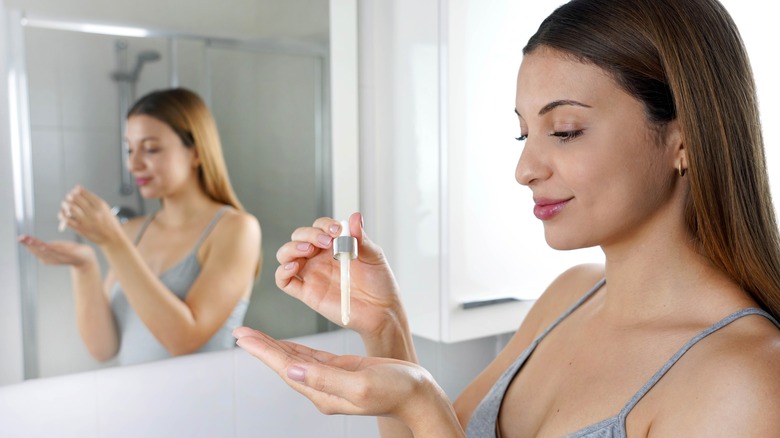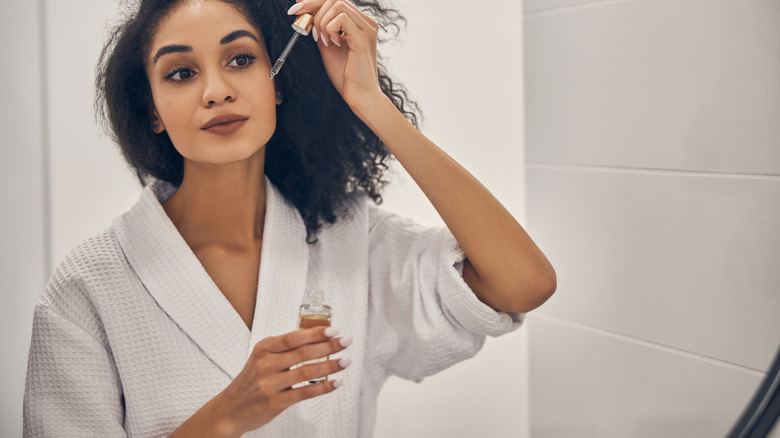Signs Your Vitamin C Serum Isn't Working For You
A quick scroll through the skincare side of TikTok will tell you that vitamin C is an essential part of a well-rounded skincare routine. Dermatologists love topical vitamin C because, if used correctly, it can drastically improve skin tone and texture. Speaking to SELF, Dr. Annie Chiu explained that vitamin C is coveted for its anti-aging properties: "Vitamin C is an antioxidant, which helps fight free radicals (unstable molecules in the body) that age the skin." Dr. Chiu added that some evidence suggests it can help heal damaged or scarred skin: "Vitamin C has anti-inflammatory properties and boosts wound healing by helping cells migrate to the area of the skin injury."
More than just ensuring you have the right products, if you invest money in high-quality ingredients, you need to use the right brands in the proper order and with the correct combination of products. "The order in which products are applied to your skin is critical," Dr. Alicia Zalka told ELLE. "Most of us spend hard-earned dollars and precious time on our skincare routine, so why lose out on the optimization of the effort?" If you want to get the most out of products, you need to understand when they are working and when they are not. Unfortunately, this can be especially difficult with vitamin C serums.
Pay attention to skin reactions
The easiest way to tell that your vitamin C serum isn't doing the trick is that you don't see any noticeable change in your skin. When it's working correctly, you should notice a reduction in dark spots or prominent scars. If your skin is already clear, then after a few months of dutiful application, it should look more glowy and bouncy than before.
One of the biggest indicators that it's time to look elsewhere for a serum is if you discover that the one you've been using has oxidized. "When vitamin C is exposed to air, it oxidizes and changes its form into something that isn't as effective, and it doesn't work as well on your skin," Christopher Corinthian, a skincare development chemist, explained when speaking to Refinery29. "When the oxidation happens in a product, it goes from a lively golden color to more of an orange-brown color. That's your visual clue that you might not be getting all the vitamin C the product says you're getting." One surefire way to ensure your vitamin C isn't oxidized is by purchasing a brand in air-tight packaging without clear or tinted glass. If you use oxidized vitamin C, nothing bad will happen, but you'd be wasting your time. So, before investing your money or time, follow the steps below to ensure you'll get the most out of your vitamin C.
Other things to look out for
First and foremost, when shopping for a new vitamin C serum, you'll want to confirm that the added ingredients will stabilize the formula and not detract from it. "The presence of other ingredients can make or break whether a vitamin C serum is effective or not," Dr. Stacy Chimento explained to Byrdie. "Ingredients like vitamin E or ferulic acid can stabilize vitamin C and strengthen the antioxidant reaction while being gentler on the skin." Similarly, you'll want to double-check the concentration — the sweet spot is between 8 and 20 percent.
Next, make sure to apply your products in the correct order. For example, vitamin C should be applied in the morning after your cleanser but before your moisturizer and sunscreen, per ELLE. You must let your products fully absorb before you continue to layer. "You should wait about 30 seconds to one minute [between application], which allows the product to penetrate and gives you time to do other steps in your beauty routine," Dr. Alicia Zalka told ELLE.
The most important part of a successful vitamin C skincare routine, though, is patience. "The best way to tell if your product is effective is to use it over an extended period (about three months) and note any changes in your skin and any reactions you may have," Dr. Chimento said. If the product is high quality and you're still not seeing results, Dr. Chimento said, " ... [Y]ou should consider meeting with your dermatologist to discuss changing your product for something more potent and effective."


